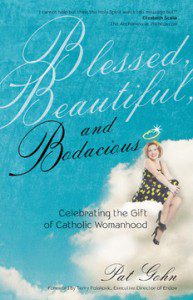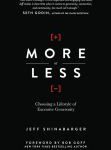I just completed reading Blessed, Beautiful and Bodacious by Pat Gohn. It is part Catholic feminist manifesto, part spiritual memoir written like an intimate conversation. It makes you feel as if she is sitting at your kitchen table talking to you. I am sure that this is very intentional on her part and I would say she greatly succeeded.
This little book holds a lot of punch and it definitely covers a lot of ground. Each part contains an illustration of that chapter’s theme from Gohn’s own life as well as from the Blessed Mother, Mary. I can relate to Gohn’s struggles in connecting with Mary. When I first converted to Catholicism, I was all about Mary. Mary was very influential in my conversion. But as time has gone by, I have drifted away from her.
This book didn’t bring me back, but I can see how Gohn’s defense of Mary could easily bring someone else back. She defends well Mary’s essential role in salvation history. She explains that Mary wasn’t some kind of demure female. She had to have been strong to say yes to carrying God’s Son and to stick with her Son to the end.
This is one of the redeeming characteristics of the book. While she does characterize all women as receptive, generous, sensitive, and maternal, she does spin all of these to mean not quite what you’d expect. For example, take “sensitive.” She argues that sensitivity is not a weakness. As she says, “A woman may cry over something sad or disappointing that touches her heart, but those tears often become like fuel that powers an engine…they move her to do something!”(pg. 94)
The majority of the book is a personal conversation between Gohn and the reader. In the last few pages, however, she blows the whole thing wide open. She moves from talking to the woman individually to talking to society as a whole. It left me a bit whiplashed, but I could follow her.
She calls on all women to stop trying to gain equality by imitating men but by embracing our complementarity with men. Gohn, and the Catholic Church as a whole, sees this written in the female body. Women have the physical capacity to bring new life into the world and to nurture that life at her breasts. Men can’t do either one. This leads us to an understanding that men’s and women’s roles cannot be interchangeable, but they can be equal.
To my own surprise, I walked away from this book with only one major beef. Usually, I can’t even get through books that claim to be from Christian feminists because they seem to glorify being “barefoot and pregnant in the kitchen.” In this book, my issue is that generalizations are never accurate. She rightly sings the praises of motherhood and being a caregiver, but not all women are gifted in those areas. At one point, she says that a woman’s happiness is found in her relationships (pg. 37) and I wonder, “what about the lone wolf?” God calls each of us by name. He knitted us all individually in our mother’s womb. Not all women are receptive, sensitive, generous and maternal and we all don’t have to be. She speaks herself of difficultly learning how to be receptive (pg. 68). Women who have these gifts do need to embrace them and not see them as handicaps. But women who don’t have them don’t need to beat themselves up about it.
It is providential that in the same week I read this book I also read a Time magazine article about Sheryl Sandberg. In it, she argues the exact opposite: that women need to cut down on their caregiving duties and focus on their careers. I have only one thing to say. Women are individuals. Some are caregivers and some are cut-throat executives. Neither is undermining feminism because they are both fulfilling the main tenant of feminism, the radical idea that “women are people, too.” An important part of being a person is being an individual, uniquely called and gifted by God. There needs to be a balance and an acceptance of both sides in the feminist movement. Both sides need to come to the kitchen table and embrace one another. Then and only then will we be looking at true equality within and outside our own ranks.
 Bethanie Ryan is a stay-at-home mom, a hospital chaplain, a freelance writer, a lay minister, an armchair bioethicist and an all around nerd. When she has free-time (oh, that’s funny). she likes to read science fiction novels and watch Doctor Who. When she’s on the clock, she’s serving women in labor in her chaplain capacity. She is a convert to the Catholic Church. She was baptized in December 2004. She hails from Missouri, but right now she unfortunately lives in New York. She has been married to the love of her life for almost 2 years and she’s been taking care of the other love of her life for almost a year. She is discerning a vocation as a Lay Dominican. She blogs about medical ethics and other random stuff at The Syrophoenician Woman . She loves to teach. She loves to learn even more.
Bethanie Ryan is a stay-at-home mom, a hospital chaplain, a freelance writer, a lay minister, an armchair bioethicist and an all around nerd. When she has free-time (oh, that’s funny). she likes to read science fiction novels and watch Doctor Who. When she’s on the clock, she’s serving women in labor in her chaplain capacity. She is a convert to the Catholic Church. She was baptized in December 2004. She hails from Missouri, but right now she unfortunately lives in New York. She has been married to the love of her life for almost 2 years and she’s been taking care of the other love of her life for almost a year. She is discerning a vocation as a Lay Dominican. She blogs about medical ethics and other random stuff at The Syrophoenician Woman . She loves to teach. She loves to learn even more.














